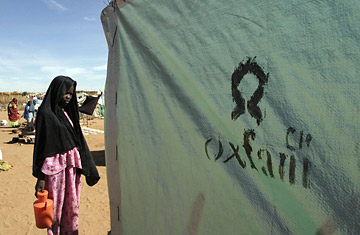
A Sudanese girl waiting to use toilets set up by the international aid organization Oxfam in the Abu Shouk refugee camp, on the outskirts of El-Fasher in Sudan's northern Darfur region.
Western aid groups in Darfur were forced to close clinics and put off a meningitis vaccination campaign Thursday because of the Sudanese government's decision to revoke their registration hours after President Omar al-Bashir was made the target of an international arrest warrant.
Ten aid groups were told to suspend operations by Sunday, three days before the International Criminal Court issued an arrest warrant for al-Bashir on charges of war crimes and crimes against humanity in Darfur. Just hours after the arrest warrant was announced Wednesday, Sudan's Humanitarian Aid Commission told the groups that their registration was being revoked. (See pictures of Darfur descending into chaos.)
On Thursday, the government announced it was expelling three more groups. Most of the aid organizations worked in Darfur, providing things such as water, proper sanitation, food and medical assistance to hundreds of thousands of people in the troubled region. The groups say they have no clear idea why they had been targeted, and their aid efforts in the autonomous region of South Sudan have not been affected. "We've actually received no official reason or explanation," said Kurt Tjossem, Regional Director for the Horn and East Africa at the International Rescue Committee. "We did ask them on what grounds and that was not responded to."
The 13 groups, which include Oxfam, CARE International and the Dutch and French branches of Doctors Without Borders, have been told to turn over bank account information and lists of their assets. Vanessa van Schoor, Sudan operational manager for MSF Holland, said government agents had begun seizing computers and scanners at the group's offices.
The logic behind the government move was not clear. Save the Children U.K., for example, has not worked in Darfur since 2005, but was on the list nonetheless.
At a rally on Thursday following the ICCs indictment announcement, Bashir told a crowd that the aid groups had broken the law, though he did not say how. "We will act as a responsible government," he said, according to The Associated Press. "But we will be responsible and firm with anyone who tries to get at the stability, security in the country or whoever uses their position and presence in Sudan to violate the law, stability and security."
Some of the groups have been forced to shut down operations completely. An MSF hospital in the Kalma Camp in South Darfur has been closed. Boreholes operated by the International Rescue Committee have fuel to pump water for two more weeks. MSF Holland had planned a campaign to vaccinate 91,000 people against meningitis, but that been called off despite the presence of meningitis around the city of Nyala, near Kalma. "We were prepared for a mass vaccination campaign and were just waiting for the vaccine to arrive," said van Schoor. "Now I don't know what's going to happen with that."
Fighting in Darfur began in 2003 and an estimated 300,000 people have died since then. In addition, some 2.7 million have fled their homes, and about 2 million are almost entirely dependent on aid groups to survive. (See pictures of being under death's shadow in Darfur.)
Some groups, including the World Food Program and Catholic Relief Services, were allowed to continue operating. Still, several of the organizations were the only ones providing their particular services — MSF and the IRC, for example, were the sole providers of medical services in the Kalma, and their clinics will either be closed or run by internally displaced people with minimal training.
Those that remain will find their work seriously hampered. The World Food Programme relies on four of the affected aid groups— Action Against Hunger, CARE, Save the Children U.S. and Solidarites— to distribute its food. "WFP and other humanitarian agencies simply don't have the capacity to take over their life-saving work. The total number of people who receive WFP food through the four NGOs is 1.1 million," the World Food Programme said in a statement.
"To be honest, as of today, the situation looks pretty bleak," says Tjossem of the International Rescue Committee. "I hope we will be able to establish a dialogue and convince the government that we provide a valuable service. We are being told one thing, and we need to reengage, and I'm not sure how easy that's going to be."
